
There are few occasions when, while talking with someone, you get the feeling that you have 3 generations of people in front of you. But, this chat with Marios Lanitis did not leave any doubt about that: the interview was meant to become a flashback in the Group’s course, from the farmer grandfather from Laneia village, to his father and uncles, and then his own, his 2 brothers’ and sister’s present. After all, the office at the classical mansion, right next to the Limassol City Hall, is also part of the history of Lanitis family.
The mansion, house of the grandfather, Costas Lanitis, is still today a connective bond between the family and the heart of the city. “We intended to keep this building and so we did pursue to have it declared a preserved one. It is part of the history of Lanitis Group and, even if it is not that suitable for an office, we still stay here because of the way we feel about it”, he explains. With this building being the core of the activities of Evagoras Lanitis’ children, the heads of the business today, the stories of Marios Lanitis do revolve around the heavy heritage he and his brothers have received, as well as the crucial role of their father in the Group’s developments, as well as their own personal development.
In fact, this was his wish, when he accepted the invitation for an interview (his first interview ever about everything). During the entire time, both at the interview and the photo shoot, simple and approachable, without any sign of arrogance, he kept repeating that he wasn’t by himself in all of these, but along with his brothers, as well as a large group of amazing associates. But, he did give his concession for this interview, since he does recognize All About Limassol as the Official Source of Information about Limassol, a Project with quite a unique role in the city’s growth, the same city that he holds near his heart, too. Thus, he speaks on behalf of a large family of important businessmen, not merely by his own point of view.
He spent the first years of his life next to an empty piece of land, which then became one of Limassol’s first hotels, Curium Palace. The construction site was the children’s playground, since they would climb up to the fourth floor, playing hide and seek. Out of the gang of that childhood phase, some children are still among his dearest friends.
“There was just the Municipal Garden back then and the Governor’s house. All the rest were just empty fields…
My school was on Gladstonos Street, the Second Public School, as well as the places we used to hang out for fun, before the entertainment spots at Makariou Avenue came up, around the end of the 1960s. Oroskopo, opposite Trittoftides clinic, was the most famous of all, while during the summertime we would usually visit the disco at the basement of Splendid hotel in Platres”, Marios Lanitis recalls, as he narrates his memories from the Limassol he grew up in.
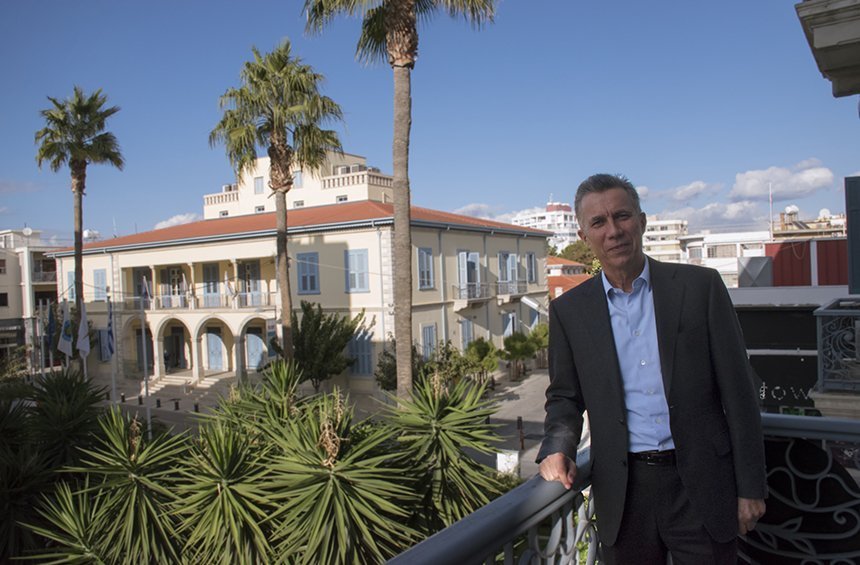
“We intended to keep this building and so we did pursue to have it declared a preserved one. It is part of the history of Lanitis Group and, if it is not that suitable for an office, we still stay here because of the way we feel about it”,
The memories of his youth move slightly to the north, at the large piece of land his uncle, Nicholas Lanitis (N. P. Lanitis) donated for the larger school of the city, Laniteio, to be built in. One would expect that going to a school with the same name as his, would be kind of awkward. But, since his older brothers led the way in the school and the family’s relations with the city were rather smooth, in a time when self-projection and discrimination against part of the students were non-existent, they were all able to enjoy perfectly normal school years.
“Back then, people in Limassol were more simple. No one would ask for attention, to feel different than the others, and the society wouldn’t treat you differently, providing exposure depending on one’s name or profession…
….There have always been different social classes, but we did not see any difference in our everyday lives. Now there are the Media, both the Press and the TV, that project a certain lifestyle, making some people stand out and even give a fake value to them.
His rides, strolling around, on his bike are among the most intense memories of his adolescence. On the contrary, he finds it hard to remember the screenings at Rialto cinema, which he watched from a private balcony, since the building did belong to N. P. Lanitis, the company that bought it from the initial investor and implemented its construction. Still, as much as his memory might skip these screenings, it does recall some rare moments at the cafeteria, where boys could interact with girls of their age, since that was prohibited at school and everywhere else in the city.
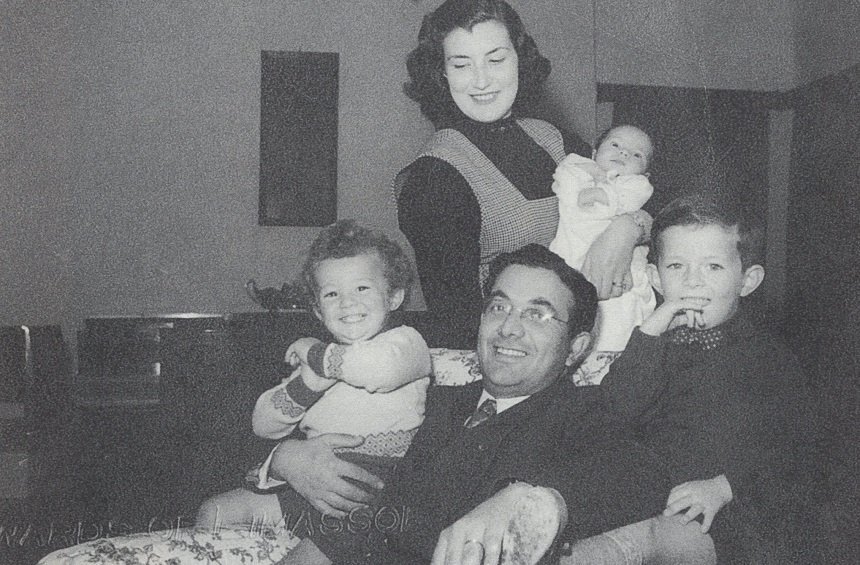
Evagoras and Kathleen Laniti, with their 3 boys, Costas, Plato and Marios (a picture from the large collection of photos featured in the biography of Evagoras Lanitis).
Everything he admits during our talk is more or less related with the course of the family. Even his confession about his less than perfect grades in some classes at school, are related to the fact that this was never something to worry about. “For a businessman, common sense (which is not that common, after all) can be more important than a degree…
For a businessman it is also important to ask and to hire people that know what he doesn’t, because common sense says that you cannot know everything”, he explains.
Thus, a large part of his personality is the result of the education he received from his own father, Evagoras Lanitis, which played a formative role both for him and his brothers. “He would takes with him at work every so often, to watch from a close up view how was everything operating, for example when the grapes were loaded at the port at night”. Of course, he admits that his Scottish mother, Kathleen’s, simplicity and kindness were a decisive model for his own character, too.

The impressive sight of The Oval, apart from a rather unique addition to the city’s image, it does provide a unique view over the city for those using it, too
“I may have studied engineering, but I did go to Mr Evagoras’ ‘university’, too, in which I would learn about entrepreneurship”, he stresses out, explaining that he shared this experience with the other 2 boys in the family, Plato and Costas. “I always enjoyed engineering, I was interested about the reasons that made a building stand, how was a watch or a mechanical game operating – I was the technician of the house, who would fix things, upon compensation, of course”, explains the businessman, who feels that he satisfied his natural inclination, without making a detour to the course that was already sketched out for him, due to his name.
Out of the 4 children of Evagoras and Kathleen Lanitis, Costas, Plato, Marios and Isavella, the 3 boys are the ones that now continue the business tradition of the family and the Group. It is a tradition that first started with the great grandfather of today’s heads of the Group, Panayis Lanitis, who used to come to Limassol from Laneia village, to sell the products of his fellow villagers. His name was originally Panayis Sykas, but coming from Laneia, he became known in Limassol with the surname Lanitis, which indicated his origins. His sons were Costas (father of Evagoras Lanitis) and Nikolas Lanitis.
“My grandfather and his brother were farmers and they used to buy land, such as the farm in Fasouri, as well as the land in Alektora, Lakkos tou Frangou and at Kouklia villager, where the Aphrodite Hills was developed afterwards.
… My father, Evagoras Lanitis, grew up as a farmer, too. But he was the one that made N. P. Lanitis and Lanitis Farm larger and created Cybarco, Amathus and other, more recent, companies of the Group…
My father had studied abroad, at Cambridge, and he managed to bring the company into a professional level, which was much needed, since the completion was growing bigger, too”.
Passing from farmers’ activities to tourism, constructions and other fields, happened just as naturally as the evolution of Amathus, from a shipping company, into a company of the tourism and hotel industry. Every time that one of Lanitis men noticed that one of the businesses was not that profitable or had no prospects to grow, they wouldn’t hesitate to leave it behind and jump into something new.
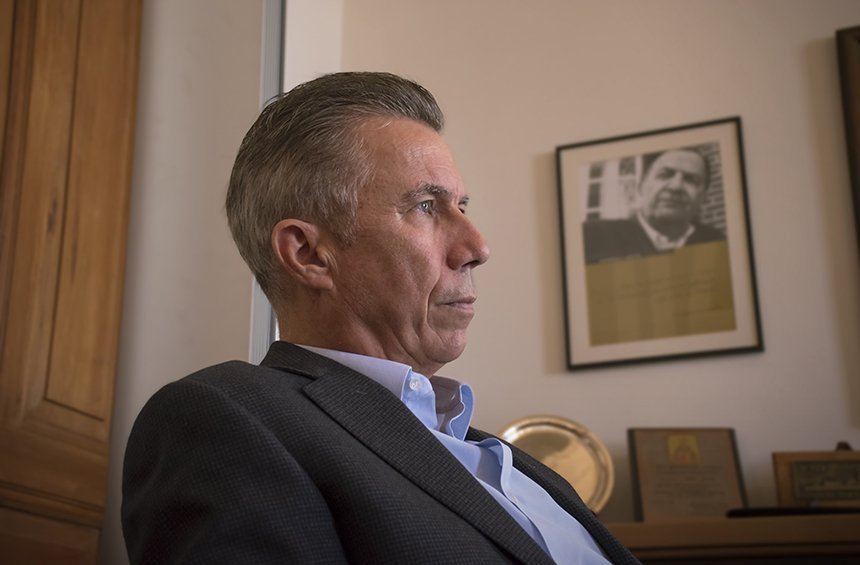
Evagoras Lanitis’ biography, the cover of which is portrayed in a prestigious place in his son’s office, is not just the narration of a businessman’s and a Limassol’s benefactor’s life. It is also the narration of Limassol’s course of growth, from the half of the 20th century and on.
“My grandfather even had a company for making paints, the Cyprus Colors Company. Once, we even had a battery manufacturing company. When you see that something doesn’t work, then you decide to shut it down and turn it into something else. What you have invested in that company will be reinvested in this new thing. Aphrodite Hills was a pioneering venture when it was implemented. We had to wait 21 years just for the permits. It did lead the way to the construction of other golf courts, too, which did not exist in Cyprus before. The same happened with Amathus Hotel, which was one of the first hotels built on Limassol’s seaside. The Oval was a pioneering construction, too, as well as the Limassol Marina, which was implemented along with other investors. These are the ventures we had to risk for to introduce something new. Limassol needs pioneers”.
How big was the hit in 2013 for the Group?
The hit in 1974 sure was much bigger, because it affected everyone in Cyprus in the same degree and people died. The hit in 2013 was very severe for the economy, but some were affected more than others. Of course, in business things are not always great and losses are part of the game.
If you do not accept and take in account when making plans the possibility of a loss, then you cannot be a good businessman.
Back then, with the collapse of Laiki Bank, there was a large problem for every business on the island. Of course, the pressure that was generated from the responsibility to continue the work of a Group with a course of over 1 century, was great. Within a night the balance sheets of Lanitis Group lost a large investment and the amount of hundreds of millions disappeared, while the liabilities of the Group were still the same. This was something that we had to handle. We needed liquidity and the banks could not give any loans. Thus, we decided to proceed in some strategic partnerships, such as in the case of Amathus Hotels in Limassol and Paphos, and in Aphrodite Hills, to ensure liquidity without having to sell out any companies.

The wooden, twirling staircase, which leads to the company’s offices, and the artistically decorated wooden door, are both very distinctive elements of the old mansion at the city’s historical center.
This partnerships, though, were discussed a lot and not always in positive perspective.
People are not mean. But the Media will always choose to present the negative, the bad news. Thus, people is trained to consider about the negative side of things first. What you do in All About Limassol, showcasing the positive side, is what people might actually do eventually, on a second thought. That is, one may consider a positive side, but only after the negative one.
Thus, All About Limassol can train people in this part, which makes the role of this Project very important for Limassol’s evolution.
You have a great responsibility, because thousands of people trust you and you need to keep going with what you started, stating the truth, in order to help the city and the well-being of its people, without prioritizing the increase the number of your own readers.
Didn’t you make any mistakes?
There is always a chance that you might make a mistake, all businessmen make mistakes. In this particular case, though, there were many other factors and the political responsibility that led to recession was great indeed. Of course, in a company, the greatest mistake is to not make decisions, to not face the problems. You need to make a decision, even if it turns out to be wrong. As long as you allow the problems to persist, they will only sum up.
Don’t you care about what people think?
I was never concerned with gossip. Of course, each one of us is responsible to keep a good name and be appreciated by the people. In general, all employers should be straight in their behavior. This is something my father and grandpa passed on to us. My father always said that to move forward, the society needs to be moving forward.
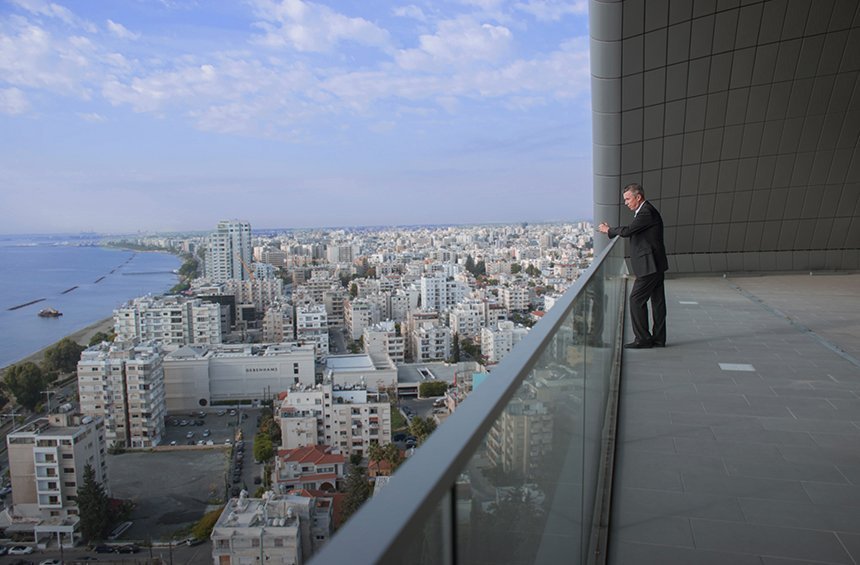
What is your relationship today with the historical center of Limassol?
I know the old city very well and I like it. But I don’t have absolute opinions about the fact that we shouldn’t “disturb it”.
Is there something bothering you on the image that Limassol has today?
The lack of order is a big problem. We solved the issue of illegal parking on the sidewalks with the poles, but that didn’t solve the problem of the parking in general. Besides, I don’t agree with this measure, I would prefer the increase of the policing. Beyond the city center, however, the beachfront also has many problems, like the lack of order in the image of some shops that put every kind of signpost everywhere or use aluminum and glasses to cover extra spaces.
Why is this?
The law is not in effect. Is it that they can’t or won’t apply it? This I do not know. But the impunity for those who don’t follow the law, is certainly a problem. One such issue, for instance, is graffiti. There are those who make art with graffiti and for that there is a festival in Limassol and that’s fine, but there are some who just make scribbles and stain the walls unnecessarily. No one will ever punish some of those who dirty the city.

In the busy schedule of the day, humor is always a means to ease the tension and the fatigue, even if this seems opposite to the standard image of the conservative entrepreneur.
What is it, then, that doesn’t allow the law to be in effect?
The issue of patrols is certainly a matter of cost. The municipality, for example, has limited funds. Will the municipality decide to allocate the funds for the implementation of works or will spend them on paying the policemen for patrols? The police patrols are a cost to the society. More, there is of course, the question of how effective are these patrols.
It’s, of course, a matter of society and culture the respect for the public or foreign private property.
Is traffic bothering you?
It’s definitely a problem. Like it is for example the lack of parking spaces, or the need for everyone to park just outside their destination. The other day I was in London and like every time I visit the city, my transportation is always done through the underground and the bus. I choose it because it is effective: it goes everywhere and has now a system that you can easily pay with your smart watch. There is also an application that shows you how you can get to your destination easier by using the means of transport. In Limassol I don’t think there is a sufficient alternative to the car at this stage and this must definitely be one of the things that will change in our city in the years to come.
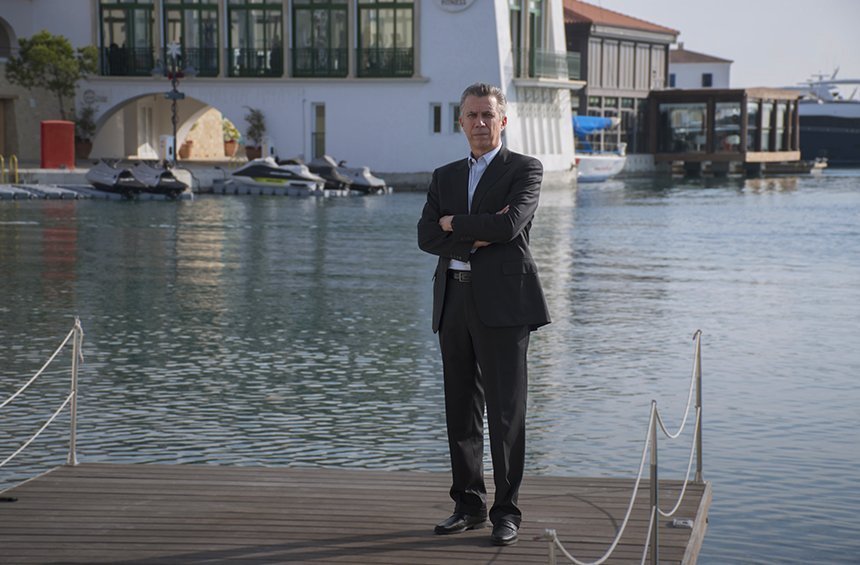
If someone would ask me today, which area is the best to invest, I would say that western Limassol has good prospects.
What else would you like to change?
Some areas are downgraded, such as the neighborhoods around the road that leads to Zakaki, the Franklin Roosevelt Avenue, the Missiaouli – Kavazoglou Street. There, there is the need for major corrections on the infrastructure. West Limassol has a future and a prospect.
With the development of the integrated Hotel and Casino resort, with the operation of My Mall, with Limassol Greens Golf Resort, which Lanitis Group designed in the West Limassol, with residences and golf course, as well as with other infrastructure and sports facilities, and with Fasouri Waterpark, many perspectives are opening. Also, office facilities or even business-type hotels could be developed. The private initiatives are the ones that create the conditions for new infrastructures and this means total upgrading of a region.
What is the great need you recognize today in Limassol?
A better traffic system. At the next 5 years, the beachfront will have a bigger problem. These humped crossings, which have been created in many places, can help the pedestrians, but not the traffic. Overpasses could be a solution, though they are not very attractive when the pedestrian has to take up the stairs. The escalators could be a solution, because it would be easy to climb and the pedestrian would also enjoy the view from above.
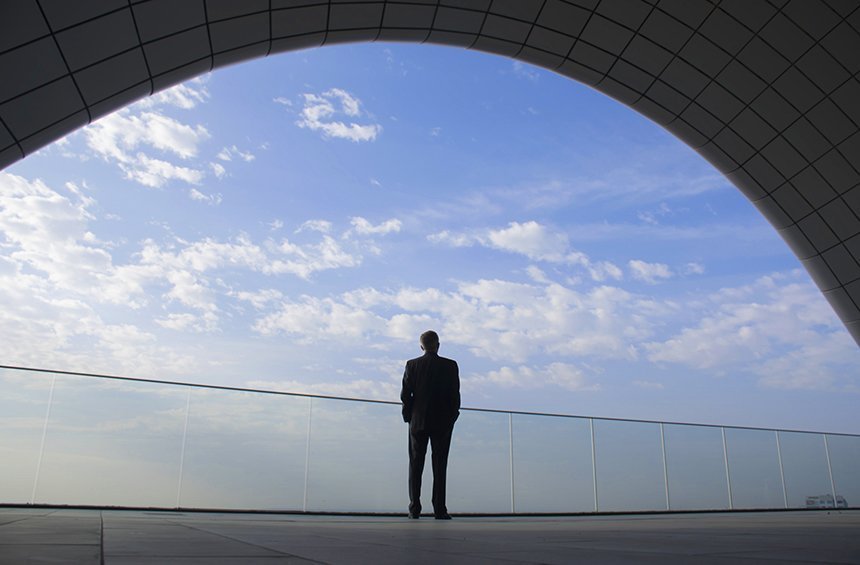
High rise buildings are something that Limassol really needs?
Limassol should have been planned to become a taller city since the 1950s. If you look at the city from the north of Limassol, from the hills, you can see it spreading from Fasouri to Agios Tychonas and the cement factory. High rise buildings are the future. How much wider could Limassol be?
All these are done according to a plan by the Municipality and the Town Planning, they are not anarchic. There are some axes on which high rise buildings can be built, as long as specifications are met, such as the area of the expansion, where they will be built, the building coefficient, etc. High rise buildings are not built by whoever who wants or anywhere one wants.
But, of course, some people do not have any profit from the high rise buildings and that’s why there are reactions.
Our new project, Trilogy, is built on an area of about 70.000 square meters of land, of which only 20% will be covered by the footprint of the buildings. The remaining area will be an open space. So, which wall is created here? On the contrary, if you look at the area of Enaerios, with all those blocks of flats in the row, wouldn’t be better to have only 1 tall building with a smaller area, and the space to be open? One could use the whole coefficient of an area and let the building goes higher, leaving a big square in front, free for the people.
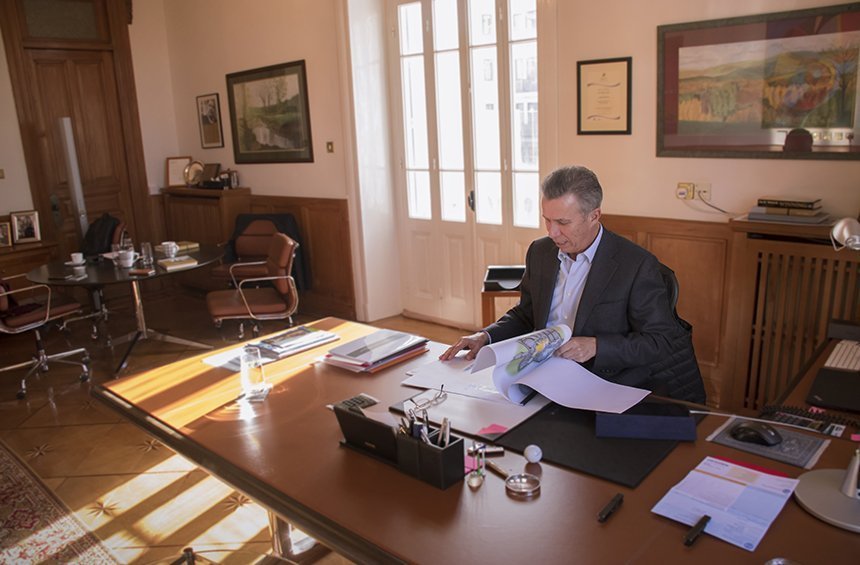
How was the decision taken to demolish the Lanitis Villa?
Each building serves the purpose for which it is built, for 33 years, on average. During this time, its technology, its construction is considered obsolete. Then, it stops being useful for the original purpose that was built. The villa was built in the late 1950s. Today, 57 years later, it was no longer serving the purpose for which it was built. It was just a big house, old and not preserved, surrounded by blocks of flats, though, when my father bought it, it was such a wilderness that they used to tell him that the beasts would eat him if he stayed there. The area in which it was built is enormous and is a very important investment.
If my father lived today, he would probably be the first to demolish the villa. He was a practical man, a businessman, who was not driven by the emotion. Besides, this building had no particular architectural value nor served any specific purpose anymore.
The reactions to the big expansions are due to the interests, then?
Media play a major role in this debate. When a title "Another tower ..." comes out every now and then, the impression of a storm of new towers is created, while this is not applied. Announcements may come out every day, either for projects that are likely to begin, or for works an investor may have in mind to buy an estate, in which he is thinking to build and he has also thought a name for what he would like to build. Today, licenses may have been issued for 4, 5 or 7 big expansions, to be completed in the next 5 to 10 years, but the impression that has been created, is for a multiplied number.
Reactions will always exist, but one must also look for the interests behind them. These interests may include the purely individual ones of someone losing his view, until the corporate ones, from those who may lose customers by the competition. But this is the free market, since everything moves inside the context of the laws.
Are Limassolians really proud of the city or they don’t know its advantages?
The Limassolian recognizes the beautiful elements of the city, from the smallest to the bigger, from the small and beautiful sandwich shop in Saripolou to the new luxury dining areas.
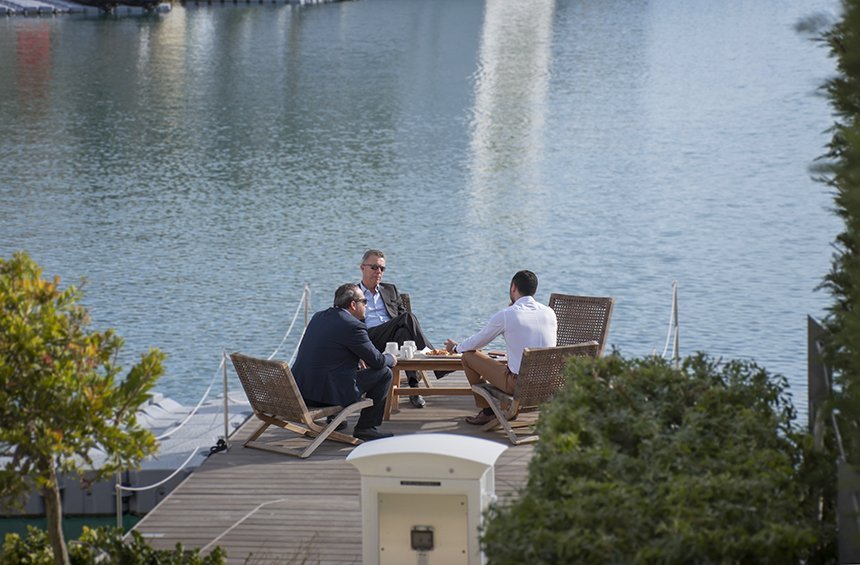
On the left, Antonis Papas, Marketing and Communication Officer of the Group, is one of his close associates. He was next to him during the whole interview and the photo shooting, always calling him "Mr. Marios", letting a more intimate, with mutual respect, relationship to be shown, rather than a relationship between a submissive towards his boss.
The children of Evagoras and Kathleen Lanitis, Kostas, Platonas, Marios and Isabella, are the continuers of a name that became synonymous to success, innovation and development. With the progress made by their predecessors, the legacy they carry is heavy, but even more serious is their responsibility towards Limassol. Besides, the family is an organic part of the city, with a long lasting connection to the place and its people. So, for the Group's 4 leaders, success is not only the growth of their businesses, but also the preservation of a mutual respect and mutual appreciation with the Limassolians, as it has been built for decades, on the streets and on the spots of the city.
Just a few years ago, Marios Lanitis decided to enter gym into his life, after his daughter's encouragement. Since then, most of his days start at the gym. "I'm stuck to my watch," he admits, as if he regrets a little bit that also carries in his personal life the strict planning that follows every day at the office. But Saturdays are unnegotiable "for Mario" and his excursions to golf, while Sundays are always for the family. Thus, between the big plans, the big deals, the big projects, the big investments and the big storms, there are always the small moments of daily serenity, which, after all, are the quintessence of a full and balanced life, where the small complete the big, achieving the ideal analogy to the recipe of a man’s happiness.